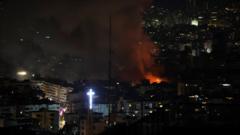In the wake of arrest warrants issued by the ICC for Prime Minister Benjamin Netanyahu and former defense minister Yoav Gallant, many Israelis are rallying in support, viewing the situation as an attack on Israel’s sovereignty.
Netanyahu Rallying Support Amid ICC Arrest Warrants

Netanyahu Rallying Support Amid ICC Arrest Warrants
Israelis show increased solidarity with Prime Minister following International Criminal Court warrant and claims of war crimes.
The recent arrest warrants issued by the International Criminal Court (ICC) for Israeli Prime Minister Benjamin Netanyahu and former defense minister Yoav Gallant have ignited a storm of controversy and outrage across Israel. The warrants accuse both men of war crimes and crimes against humanity linked to the ongoing conflict in Gaza. However, instead of deteriorating Netanyahu's support, many in Israel seem to be rallying behind him, seeing the arrests as an attempt to undermine the nation's leadership.
Critics, including long-time journalist Sima Kadmon, have expressed embarrassment over Netanyahu's association with infamous leaders like Muammar Gaddafi and Slobodan Milosevic due to the warrants. Nonetheless, Kadmon acknowledges that allegations against Israel might stem from deep-seated antisemitism, reflecting broader political divisions within the country.
Despite such dissent, political analysts suggest that the arrest warrants could paradoxically bolster Netanyahu’s position among the Israeli populace. According to Mitchell Barak, an Israeli pollster who previously worked with Netanyahu, the prime minister's characterization as a victim of global hostility plays well among citizens already polarized by the war. The concept of Netanyahu as "the lonely man standing against all the evil in the world" resonates with many, and could further consolidate support for his government during a critical period.
As the situation continues to evolve, the long-term implications for Netanyahu's leadership remain uncertain, as many Israelis process the intersection of national identity, conflict, and international justice. The sentiment now appears to lean toward a collective defense of their prime minister, for the time being overshadowing the serious charges leveled against him.





















